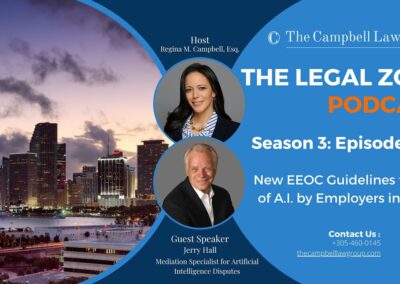En Ley de Estadounidenses con Discapacidades (ADA) es una legislación histórica sobre derechos civiles destinada a impedir la discriminación de las personas con discapacidad en todos los aspectos de la vida pública, desde el empleo y la educación hasta el transporte y los alojamientos públicos.
Aunque su propósito es fomentar la accesibilidad y la inclusión, muchos propietarios de negocios de Florida se están encontrando en el punto de mira de demandas por incumplimiento, a veces incluso sin saber que lo estaban infringiendo.
En Florida, las repercusiones de no cumplir las normas de la ADA pueden ser graves, tanto legal como económicamente. Incluso infracciones aparentemente menores, como la falta de una barra de apoyo en un baño o una puerta estrecha, pueden dar lugar a demandas costosas y que requieren mucho tiempo. Sin el apoyo de un abogado con experiencia en defensa de empresas, superar estos retos legales puede ser abrumador.
Con la creciente prevalencia de las demandas de ADA "drive-by" en Florida, es crucial que los propietarios y dueños de negocios estén atentos. Un abogado con experiencia en la defensa del cumplimiento corporativo puede evaluar proactivamente su propiedad para el cumplimiento, responder a las cartas de demanda o demandas, y negociar resultados favorables que protejan sus intereses comerciales.
Lo que las empresas de Florida deben saber sobre el cumplimiento de la ADA
Para muchos propietarios de negocios en Florida, el amplio alcance de la ADA y el potencial de costosas disputas legales debido a descuidos menores puede ser una sorpresa. Es esencial entender que la ADA regula una amplia gama de aspectos, desde los derechos de los empleados hasta el diseño de las plazas de aparcamiento y los requisitos de señalización. Esta comprensión puede ayudar a las empresas a tomar medidas proactivas para garantizar su cumplimiento.
ADA Título I - Empleo
El Título I se aplica a las empresas con 15 o más empleados y prohíbe la discriminación de las personas cualificadas con discapacidad en todos los aspectos del empleo. Esto incluye los procedimientos de solicitud de empleo, la contratación, la promoción, la remuneración, la formación laboral y el despido.
Las empresas de Florida también deben garantizar que ofrecen adaptaciones razonables -como horarios de trabajo modificados, tecnología de asistencia o espacios de trabajo accesibles-, a menos que hacerlo suponga una carga excesiva. La aplicación del Título I corre a cargo de la Comisión para la Igualdad de Oportunidades en el Empleo de EE.UU. (EEOC)y las infracciones pueden dar lugar a denuncias, investigaciones y, potencialmente, litigios federales.
Nuestra práctica de derecho laboral incluye:
- Asesoramiento sobre procesos interactivos y documentación de alojamiento
- Defensa en demandas ante la EEOC y litigios civiles relacionados con la ADA
- Auditoría de los manuales de empresa y los procedimientos de RRHH para comprobar el cumplimiento de la ADA.
ADA Título II - Administración estatal y local
Aunque este título se aplica principalmente a las entidades del sector público, las empresas privadas que contratan con las administraciones estatales o locales -por ejemplo, para prestar servicios o gestionar instalaciones- también pueden verse afectadas indirectamente. Por ejemplo, si su empresa alquila espacio en un edificio propiedad del gobierno o presta servicios de transporte o recreativos a través de una asociación municipal, puede que se le exija que garantice la plena accesibilidad en virtud de los mandatos del Título II.
La aplicación del Título II corre a cargo de la Departamento de Justicia de Estados Unidos (DOJ)que tiene autoridad para investigar quejas, realizar revisiones de cumplimiento y emprender acciones legales para hacer cumplir los requisitos de accesibilidad y proteger los derechos de las personas con discapacidad.
Título III - Alojamientos públicos e instalaciones comerciales
El Título III es la sección más relevante para las empresas privadas y los propietarios de Florida. Exige que todos los lugares de alojamiento público, ya sean de nueva construcción o existentes, sean accesibles a las personas con discapacidad. Esto incluye los negocios que están abiertos al público, tales como:
- Oficinas de alquiler de apartamentos
- Puntos de venta
- Restaurantes y cafés
- Consultorios médicos y dentales
- Hoteles, moteles y alquileres vacacionales
- Guarderías y escuelas
- Servicios profesionales (bufetes de abogados, salones de belleza, gimnasios, etc.)
El Título III impone una serie de obligaciones:
- Suprimir las barreras arquitectónicas cuando sea "fácilmente realizable" (es decir, que pueda lograrse sin grandes dificultades o gastos).
- Mantener rutas accesibles hacia y dentro de sus instalaciones, incluyendo puertas, rampas, baños, alturas de mostradores e instalaciones que excedan los límites de accesibilidad.
- Modificación de políticas y procedimientos para acomodar a las personas con discapacidad (por ejemplo, permitir animales de servicio).
- Proporcionar ayudas y servicios auxiliares cuando sea necesario para garantizar una comunicación eficaz (por ejemplo, alarmas visuales, sistemas de ayuda auditiva), señalización inadecuada o problemas de trayectoria.
- No proporcionar un servicio de atención al cliente o sistemas de punto de venta accesibles.
Florida ha visto un fuerte aumento de las demandas relacionadas con la ADA, especialmente los llamados casos "drive-by" o "probador", donde las personas presentan demandas después de detectar violaciónes de accesibilidad, a veces sin siquiera entrar en las instalaciones. Revisar y solucionar los posibles problemas de forma proactiva no sólo es lo correcto, sino que también es una gestión de riesgos sensata.
ADA Título IV - Telecomunicaciones
El Título IV exige a las compañías de telecomunicaciones y a las empresas que ofrecen servicios telefónicos que garanticen una comunicación eficaz con las personas sordas, con dificultades auditivas o con deficiencias del habla. Esto incluye proporcionar:
- Teléfono de texto (TTY) y Servicios de Retransmisión de Telecomunicaciones (TRS)
- Subtitulado de programas de televisión
- Servicios de retransmisión por vídeo e interpretación a distancia por vídeo (VRI)
La aplicación de la ADA se ha ampliado para incluir la accesibilidad web, aunque la propia Ley no menciona directamente los sitios web. Ahora las empresas pueden enfrentarse a demandas si sus sitios web no son compatibles con tecnologías de asistencia, como lectores de pantalla, o no cumplen las Pautas de Accesibilidad al Contenido en la Web (WCAG 2.1). Asesoramos a nuestros clientes sobre el cumplimiento de la accesibilidad digital y las estrategias de defensa, en particular para plataformas de comercio electrónico, sitios web de servicios profesionales y aplicaciones móviles.
La aplicación de este título corresponde a la Comisión Federal de Comunicaciones (FCC)y las empresas -especialmente los centros de llamadas de atención al cliente, los proveedores de atención sanitaria y las empresas de medios de comunicación- deben asegurarse de que cumplen la normativa.
ADA Título V - Disposiciones varias
El Título V incluye una serie de disposiciones que ayudan a interpretar y aplicar la ADA. Entre los componentes clave se incluyen:
- Protección contra las represalias para las personas que hagan valer sus derechos en virtud de la ADA.
- Definiciones de términos clave, como "discapacidad", "persona cualificada" y "ajustes razonables".
- Aclaraciones sobre la interacción de la ADA con otras leyes, como la Ley de Rehabilitación o leyes estatales sobre discapacidad
Para los propietarios de empresas de Florida, el Título V refuerza la idea de que la protección de su empresa frente a la responsabilidad civil no sólo tiene que ver con el acceso físico. También tiene que ver con la política, la formación y la cultura. No formar adecuadamente a su personal, tomar represalias contra los empleados que solicitan adaptaciones o malinterpretar lo que constituye una discapacidad pueden meter a su empresa en un lío.
Cómo un abogado defensor de negocios ADA puede apoyar su negocio
Comprender el cumplimiento de la ADA puede resultar abrumador, especialmente cuando las normas son complejas, el panorama de aplicación es agresivo y el riesgo de litigio es alto. En tal situación, un abogado con experiencia en la defensa de negocios ADA puede ser una fuente importante de alivio, proporcionando apoyo y orientación de valor incalculable.
Tanto si está respondiendo a una demanda como si pretende salvaguardar su negocio de forma proactiva, un abogado experto puede ayudarle en varias áreas clave:
Respuesta a cartas de demanda y demandas judiciales
Si recibe una carta de demanda o se le notifica una demanda, la representación de un abogado experto en cumplimiento y defensa corporativa le ayudará a responder de forma rápida y estratégica. Su abogado puede:
- Revisar la legitimidad de las reclamaciones
- Identificar las posibles defensas (como la falta de legitimación o las alegaciones de modificaciones no fácilmente realizables).
- Negociar con los demandantes para reducir la exposición financiera
- Representarle en negociaciones o litigios si es necesario.
Negociación de acuerdos y resoluciones judiciales
Muchos casos de ADA se resuelven fuera de los tribunales a través de acuerdos negociados o decretos de consentimiento. Un abogado con experiencia abogará en su nombre para minimizar los costes, evitar admisiones de responsabilidad y asegurar una resolución que proteja sus operaciones comerciales al tiempo que garantiza el cumplimiento en el futuro.
Nuestro objetivo en estos asuntos es minimizar los trastornos y el impacto financiero. Si procede, ayudamos a los clientes a negociar acuerdos o decretos de consentimiento con plazos de cumplimiento específicos, garantizando que la empresa siga funcionando al tiempo que se reducen los riesgos.
Nuestro objetivo es resolver las reclamaciones de forma rápida y rentable, a menudo sin litigar y sin admitir responsabilidad.
Formación y desarrollo de políticas
El cumplimiento de la ADA no siempre es físico; también puede ser cultural. Su abogado puede ayudarle a desarrollar políticas internas, programas de formación de empleados y protocolos de atención al cliente que cumplan las normas y reduzcan el riesgo de infracciones involuntarias.
Auditorías proactivas de conformidad
Un abogado puede coordinar o realizar una auditoría exhaustiva de su propiedad física, políticas operativas y presencia digital para identificar posibles infracciones de la ADA. Estas auditorías están diseñadas para detectar los problemas antes de que den lugar a quejas o demandas y proporcionarle un plan de acción claro y priorizado para remediarlos.
The Campbell Law Group: Su socio en la defensa de la ADA y la representación legal estratégica
The Campbell Law Group P.A. es un bufete de abogados boutique que concentra su práctica en litigios comerciales y empresariales complejos, derecho inmobiliario y asuntos de derecho laboral relacionados con la empresa. Con un profundo conocimiento del intrincado panorama legal y normativo de Florida, nuestro bufete se encuentra en una posición única para ofrecer asesoramiento y representación integrales tanto a empresas como a particulares.
En el núcleo de nuestra filosofía de trabajo se encuentra el compromiso con la defensa estratégica y orientada a los resultados. Reconocemos que los litigios pueden ser costosos y perturbadores. Por ello, nuestro principal objetivo es ayudar a los clientes a evitar conflictos legales innecesarios mediante la identificación proactiva de riesgos y la búsqueda de soluciones eficientes y rentables siempre que sea posible. Hacemos especial hincapié en el asesoramiento jurídico preventivo y en la evitación de conflictos, adaptando nuestras estrategias para apoyar los intereses a largo plazo y los objetivos empresariales de nuestros clientes.
Cuando el litigio se hace necesario, The Campbell Law Group P.A. aporta un enfoque sofisticado y tenaz a la representación. Estamos totalmente equipados para guiar a los clientes a través de cada fase del litigio, desde las investigaciones previas a la demanda y las negociaciones hasta el juicio y, si es necesario, los procedimientos de apelación. Nuestro equipo legal es conocido por su preparación meticulosa, defensa persuasiva, y dedicación inquebrantable para asegurar resultados favorables, incluso en los asuntos más complejos y de alto riesgo.
Si usted es propietario de un negocio que se enfrenta a una demanda relacionada con la ADA, una empresa que se enfrenta a una disputa laboral, o un individuo involucrado en un asunto de derecho de familia de alto patrimonio neto, puede confiar en The Campbell Law Group P.A. para una orientación jurídica sólida, un servicio excepcional y un compromiso con la excelencia en cada etapa de la representación. Póngase en contacto con nosotros hoy para discutir cómo podemos ayudar a salvaguardar su negocio, mantener el cumplimiento de la ADA, y proporcionar la representación legal especializada que necesita para avanzar con confianza.
Preguntas frecuentes
¿Qué es la ADA y cómo se aplica a mi empresa?
La ADA es una ley federal de derechos civiles que prohíbe la discriminación de las personas con discapacidad. Se aplica a casi todos los negocios abiertos al público, así como a las empresas con 15 o más empleados. Las empresas deben garantizar que sus instalaciones, servicios y prácticas de empleo son accesibles y cumplen los requisitos de la ADA.
¿Cuáles son las infracciones más comunes de la ADA que dan lugar a demandas en Florida?
Algunas de las infracciones más frecuentes son:
- Baños inaccesibles (por ejemplo, sin barras de apoyo)
- Aparcamiento para minusválidos mal señalizado o insuficiente
- Puertas o caminos estrechos
- Falta de rampas o de señalización adecuada
- Incluso los descuidos aparentemente menores pueden desencadenar demandas.
¿Qué es una demanda "drive-by" del ADA?
Las demandas "drive-by" se producen cuando los demandantes o sus abogados identifican elementos no conformes -a veces sin ni siquiera entrar en el local- y presentan demandas basadas en las infracciones observadas. En Florida se ha producido un aumento significativo de este tipo de casos, a menudo dirigidos contra pequeñas y medianas empresas.
¿Qué medidas proactivas puedo tomar para evitar demandas relacionadas con la ADA?
Trabajar con un abogado experto en cumplimiento y defensa corporativa para llevar a cabo una auditoría completa de cumplimiento es un primer paso crucial. Podemos ayudarle a identificar y corregir posibles infracciones antes de que den lugar a acciones legales, actualizar las políticas internas, formar a su personal y garantizar que tanto sus instalaciones físicas como sus plataformas digitales cumplen las normas de la ADA.
¿Se aplica la ADA a espacios digitales como sitios web y aplicaciones?
Sí, cada vez se interpreta más que el Título III de la ADA incluye los sitios web y las aplicaciones para móviles, especialmente en el caso de empresas que ofrecen bienes, servicios o información pública en línea. Los sitios web no conformes pueden ser objeto de demandas por falta de accesibilidad si no son accesibles para las personas que utilizan lectores de pantalla u otras tecnologías de asistencia.
¿Cuánto cuesta defenderse de una demanda contra la ADA?
Los costes pueden variar mucho en función de la naturaleza y complejidad del caso. Sin embargo, la resolución de las reclamaciones ADA temprano-a través de acuerdos o decretos de consentimiento-a menudo puede ser más rentable que ir a juicio. El objetivo de Campbell Law Group P.A. es minimizar su exposición financiera a través de una defensa estratégica y una resolución eficiente.
¿Puede lograrse gradualmente el cumplimiento de la ADA, o deben solucionarse todos los problemas a la vez?
La ley exige a las empresas que eliminen los obstáculos cuando sean fácilmente realizables, es decir, sin grandes dificultades ni gastos. Un abogado con experiencia puede ayudarle a desarrollar un plan de corrección por fases que se adapte a sus recursos y demuestre al mismo tiempo sus esfuerzos de buena fe por cumplir la normativa.
¿Tengo que responder a una carta de reclamación de la ADA?
Sí, ignorar una carta de demanda puede dar lugar a un litigio inmediato. Póngase en contacto con un abogado experto en defensa corporativa antes de responder directamente.
¿Puedo ser demandado aunque no conociera la infracción?
Sí. La responsabilidad no depende de la intención. Las empresas pueden ser consideradas responsables de las condiciones de inaccesibilidad aunque no sean conscientes de ello.
¿Se aplica la ADA a los sitios web?
Sí. Los tribunales han dictaminado que determinados sitios web -especialmente los vinculados a ubicaciones físicas- deben ser accesibles a los usuarios con discapacidad.
¿Pueden desestimarse las demandas contra la ADA?
Sí, en algunos casos. Si el demandante carece de legitimación, el asunto ya ha sido corregido o la petición no es "fácilmente realizable", puede ser posible la desestimación.
¿Y si alquilo mi espacio?
Tanto los propietarios como los inquilinos pueden ser considerados responsables de las infracciones en función de las condiciones del contrato de arrendamiento y del control sobre los locales.
¿Por qué hay tantas demandas contra la ADA en Florida?
Florida ha sido un punto caliente para los litigios relacionados con la ADA, en parte debido a las normas de recuperación de honorarios que animan a los abogados a presentar demandas en nombre de múltiples demandantes. Muchas de ellas son demandas "probatorias" dirigidas indiscriminadamente contra empresas.
El enfoque de nuestra empresa
The Campbell Law Group adopta un enfoque estratégico y eficiente para la defensa ADA. Nos centramos en resolver los casos lo antes posible, proteger la reputación de nuestros clientes y minimizar los gastos innecesarios. Representamos a tiendas minoristas, consultorios médicos, hoteles, restaurantes, empresas inmobiliarias y otras empresas en todo el estado.
¿Se enfrenta a una queja o demanda por incumplimiento de la ADA? No espere.
Póngase en contacto con The Campbell Law Group hoy mismo para hablar con nuestro equipo de defensa y cumplimiento corporativo para proteger su empresa de una responsabilidad innecesaria.















